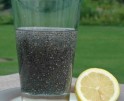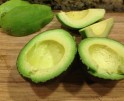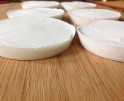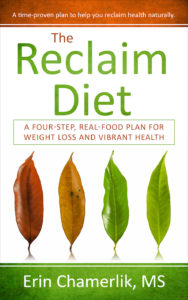
Feeding Baby
Feeding Babies
I have come to realize that almost everything my doctor told me about feeding my baby was incorrect. We started with rice cereal years ago. Sorry kids, I didn’t know!
I recommend reading Sally Fallon’s book, Nourishing Traditions. NewTrends Publishing. It is an excellent resource that I use in my home and it was also a text book in my Master’s program for Health & Nutrition Education. It is a wonderful whole food cookbook full of information and Sally Fallon explains everything simply. There is a chapter on feeding babies.
Unfortunately there are plenty of baby food books on the market that recommend soy food and soy milk. This is one of the worst foods to eat. Please read the book, The Whole Soy Story, by Dr. Kaayla T. Daniel.
I would not buy Ruth Yaron’s book, Super Baby Food.
- In this book Yaron recommends soy and I feel this is harmful advice. She also promotes nuts which are allergenic and should be avoided until after age one or two.
- Apparently she doesn’t like children to eat meat which is poor advice since young children are best equipped to digest animal foods and ill-equipped to digest grains.
Weston A. Price
To begin reading now please visit the Weston A. Price website and search under children’s health.
Here is what I believe is better advice regarding feeding baby:
1. Cereals, grains and breads are very hard to digest and should be the last foods introduced after age one! Feeding grains too early can lead to grain allergies later on. Babies don’t have adequate enzymes to digest grains. Some parents choose to strictly limit or avoid grains altogether.
2. Egg yolk
Egg yolk (not the white) can be given to baby as one of the best, most nourishing foods.
It contains vitamin A, D, E and K and minerals such as iron, calcium, and phosphorus.
Give as early as 4 months and get the eggs from pasture-raised chickens if possible.
Avoid egg white (allergenic) until after age one.
- Boil egg for 3 1/2 minutes.
- Place in a bowl and peel off shell.
- Remove egg white and discard.
- Yolk should be soft and warm, not hot, with its enzyme content intact.
Continue on with these foods:
3. Avocado
4. Sweet potato
5. Peas and carrots
6. Cod liver oil
7. At 6 months pureed meat, banana, melon, mangoes and papaya
8. Cook high pectin fruit: peaches, apricots, apples, pears, cherries and berries should be cooked to break down the pectin, which can be very irritating to the digestive tract.
———————————————————————————————————-
Here is some information you will find on the Weston A. Price site concerning feeding babies.
“Foods like cereals, grains and breads are very challenging for little ones to digest. Thus, these foods should be some of the last to be introduced. (One carbohydrate enzyme a baby’s small intestine does produce is lactase, for the digestion of lactose in milk.)
Babies do produce functional enzymes (pepsin and proteolytic enzymes) and digestive juices (hydrochloric acid in the stomach) that work on proteins and fats.12 This makes perfect sense since the milk from a healthy mother has 50-60 percent of its energy as fat, which is critical for growth, energy and development.13 In addition, the cholesterol in human milk supplies an infant with close to six times the amount most adults consume from food.13 In some cultures, a new mother is encouraged to eat six to ten eggs a day and almost ten ounces of chicken and pork for at least a month after birth. This fat-rich diet ensures her breast milk will contain adequate healthy fats.14
Thus, a baby’s earliest solid foods should be mostly animal foods since his digestive system, although immature, is better equipped to supply enzymes for digestion of fats and proteins rather than carbohydrates.1 This explains why current research is pointing to meat (including nutrient-dense organ meat) as being a nourishing early weaning food.
Children need high levels of fat throughout growth and development. Milk and animal fats give energy and also help children build muscle and bone.1 In addition, the animal fats provide vitamins A and D necessary for protein and mineral assimilation, normal growth and hormone production.27
Choose a variety of foods so your child gets a range of fats, but emphasize stable saturated fats, found in butter, meat and coconut oil, and monounsaturated fats, found in avocados and olive oil.
Egg yolks, rich in choline, cholesterol and other brain-nourishing substances, can be added to your baby’s diet as early as four months, as long as baby takes it easily. (If baby reacts poorly to egg yolk at that age, discontinue and try again one month later.)
Around four months is a good time to start offering cod liver oil, which is an excellent source of the omega-3 fatty acids DHA and EPA (also important for brain development) as well as vitamins A and D. Start with a 1/4 teaspoon of high-vitamin cod liver oil or 1/2 teaspoon regular dose cod liver oil, doubling the amount at 8 months.12 Use an eye dropper at first; later baby can take cod liver oil mixed with a little water or fresh orange juice.
If baby is very mature and seems hungry, he may be given mashed banana during this period. Ripe banana is a great food for babies because it contains amylase enzymes to digest carbohydrates.1
Puréed meats can be given at six months (or even earlier if baby is very mature). Meats will help ensure adequate intake of iron, zinc, and protein with the decrease in breast milk and formula.17
A variety of fruits can be introduced at this time. Avocado, melon, mangoes and papaya can be mashed and given raw. High-pectin fruits such as peaches, apricots, apples, pears, cherries and berries should be cooked to break down the pectin, which can be very irritating to the digestive tract.
Although avocados have a higher fat content than most other fruits (around 20 times the amount, on average), they actually contain health-promoting monounsaturated fats..
These fats are needed by your baby’s body for the healthy development of his brain and central nervous system. One of these fats, oleic acid, is believed to help lower cholesterol.
Avocado is an excellent source of potassium, containing around 60% more of this valuable mineral than bananas!
Potassium plays an important role in the regulation of blood pressure and, in later life, can help prevent heart disease, strokes and hypertension (high blood pressure).
Not only is avocado baby food highly nutritious in its own right, avocado actually helps your baby’s body more efficiently absorb the nutrients from other fruits and veggies he eats them with!
For a nutritionally complete and tasty meal for your baby food beginner you need do no more than slice open an avocado and spoon its creamy flesh straight into your baby’s mouth!
As time goes by, move up in complexity with food and texture. At about six to eight months, vegetables may be introduced, one at a time so that any adverse reactions may be observed. Carrots, sweet potatoes and beets are excellent first choices. All vegetables should be cooked (steamed preferably), mashed and mixed with a liberal amount of fat, such as butter or coconut oil, to provide nutrients to aid in digestion.
Early introduction to different tastes is always a good plan to prevent finickiness. Feed your little one a touch of buttermilk, yogurt or kefir from time to time to familiarize them with the sour taste. Lacto-fermented roots, like sweet potato or taro, are another excellent food for babies to add at this time.1
At Eight Months
Baby can now consume a variety of foods including creamed vegetable soups, homemade stews and dairy foods such as cottage cheese, mild harder raw cheese, cream and custards. Hold off on grains until one year, with the possible exception of soaked and thoroughly cooked brown rice, which can be served earlier to babies who are very mature.
At One Year
Grains, nuts and seeds should be the last food given to babies. This food category has the most potential for causing digestive disturbances or allergies. Babies do not produce the needed enzymes to handle cereals, especially gluten-containing grains like wheat, before the age of one year. Even then, it is a common traditional practice to soak grains in water and a little yogurt or buttermilk for up to 24 hours. This process jump-starts the enzymatic activity in the food and begins breaking down some of the harder-to-digest components.1 The easiest grains to digest are those without gluten like brown rice. When grains are introduced, they should be soaked for at least 24 hours and cooked with plenty of water for a long time. This will make a slightly sour, very thin porridge that can be mixed with other foods.29
After one year, babies can be given nut butters made with crispy nuts (recipe in Nourishing Traditions), cooked leafy green vegetables, raw salad vegetables, citrus fruit and whole egg.
To see the references and to read entire article, please visit: WestonAPrice.org
Recommended
-
Chia Super Food for Energy, Weight Loss & MoreAugust 8th, 2023
-
How to Freeze AvocadosJune 8th, 2023
-
How to Freeze Coconut MilkJune 1st, 2023
-
Stinging Nettle for Immune Support and MoreApril 18th, 2023









